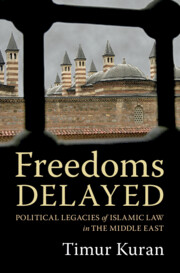Book contents
- Freedoms Delayed
- Freedoms Delayed
- Copyright page
- Dedication
- Contents
- Figures
- Tables
- Preface
- Part I The Modern Middle East’s Authoritarian Face
- 1 Islam and Political Underdevelopment
- 2 Explaining Illiberalism, Identifying Opportunities for Liberalization
- Part II Persistent Social Atomization
- Part III Religious Repression
- Part IV Economic Hindrances
- Part V Conclusion
- Notes
- Bibliography
- Index
1 - Islam and Political Underdevelopment
from Part I - The Modern Middle East’s Authoritarian Face
Published online by Cambridge University Press: 20 July 2023
- Freedoms Delayed
- Freedoms Delayed
- Copyright page
- Dedication
- Contents
- Figures
- Tables
- Preface
- Part I The Modern Middle East’s Authoritarian Face
- 1 Islam and Political Underdevelopment
- 2 Explaining Illiberalism, Identifying Opportunities for Liberalization
- Part II Persistent Social Atomization
- Part III Religious Repression
- Part IV Economic Hindrances
- Part V Conclusion
- Notes
- Bibliography
- Index
Summary
The Middle East, defined here as the twenty-two members of the Arab League plus Iran and Turkey, has a poor record on matters of governance. Even within the fifty-seven-member Organization of Islamic Cooperation, it stands out as weak on rule of law, civil liberties, and government transparency. Another salient characteristic of the Middle East is that its exposure to Islamic law (Sharia) lasted far longer than anywhere else. No Middle Eastern country is governed by Islamic law today; even Iran and Saudi Arabia operate under largely secularized laws. Yet the region’s legal history causes one to expect specific Islamic laws of the past to illuminate its poor political performance today. The legacies transcend contexts explicitly involving religion. Regardless of religious beliefs or attitudes toward religion, every decision maker in the region is constrained by institutions that bear influences of earlier institutions grounded in Islamic law. The contexts that the book’s analysis brings into focus are civic engagement, religious liberty, and economic capability. The illiberal patterns observed in these contexts are sometimes attributed to European colonization alone. In fact, whatever their harms to the region, colonial policies also mitigated institutional inefficiencies rooted in precolonial history.
Keywords
- Type
- Chapter
- Information
- Freedoms DelayedPolitical Legacies of Islamic Law in the Middle East, pp. 3 - 32Publisher: Cambridge University PressPrint publication year: 2023
- 1
- Cited by

